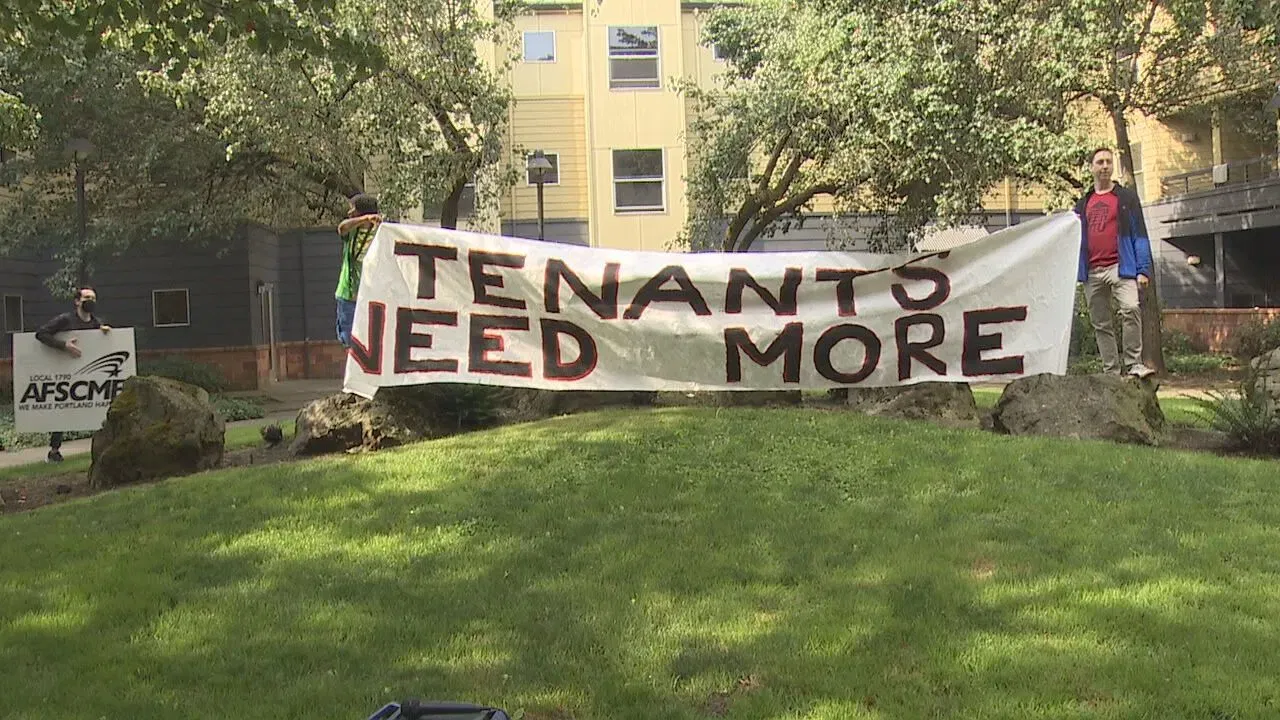PORTLAND, Ore. (KATU) — Tenant advocates say the near eviction of Daniel McLean, a 68-year-old veteran with disabilities, underscores serious flaws in Portland and Oregon’s housing systems. McLean, who lives in a low-income housing complex run by Home Forward, came close to losing his home over Labor Day weekend before last-minute intervention stopped the process.
A Call for Urgency
At a rally outside The Yards at Union Station, tenant organizers demanded reforms to prevent similar cases.
“As horrifying as Dan’s story is, there are countless others across the city being pushed toward homelessness because of this indifference and neglect,” said Gabriel Burns of Portland Tenants United. “We need to treat our housing crisis with the urgency the law demands, because inaction is a choice.”
Also Read
Tenant advocates argue that gaps in oversight, poor communication, and lack of caseworker support are driving vulnerable residents like McLean into precarious situations.
Councilor Green Intervenes
Portland City Councilor Mitch Green, who personally intervened to halt McLean’s eviction, attended the rally and used the moment to highlight broader housing solutions.
“Tomorrow I’m headed to Vienna, Austria, to study the best social housing system in the world,” Green said. “That city had all the same problems we do now, and guess what — they solved them. I want to see how they did it.”
Green’s comments referenced a six-day taxpayer-funded trip to Vienna with fellow councilors Jamie Dunphy and Candace Avalos, along with six staff members. According to the Oregonian, the trip costs about $7,000 per person and will be paid through the councilors’ budgets.
Vienna’s social housing model includes 220,000 municipally owned units rented at low cost to middle- and lower-income residents — a system Green says could inform Portland’s approach to affordable housing.
McLean’s Story
McLean, a retired military veteran, nearly lost his apartment after falling behind on about $1,100 in unpaid rent. He said he had no idea he owed money until a neighbor helped him read a final eviction notice taped to his door.
For years, his rent was fully covered through HUD-VASH, a federal program that combines rental vouchers with Veterans Affairs support. But in July 2024, Home Forward sent a notice that his voucher amount was reduced, requiring him to contribute $140 a month toward rent.
McLean, who suffers from cataract disease and only recently regained partial vision after laser surgeries, says he never understood the notice and hadn’t been able to reach his caseworker in over a year. The voicemail listed for the worker indicated they were on “extended leave,” with no mention of reassignment.
“I was blind for two and a half years,” McLean said. “My surgeries aren’t done, and they wanna throw me out on the streets. I didn’t even know I owed money.”
Home Forward’s Response
Home Forward, which oversees The Yards, declined to discuss McLean’s case in detail but defended its practices in a written statement.
“We use a policy that prioritizes assistance to residents so they can get current in their rent,” the statement read. “We connect informally with residents to discuss their overdue rent, we connect with or make referrals to caseworkers, and we offer reasonable repayment agreements at every stage of the process. In the unfortunate case when a resident fails to enter into a repayment agreement and an eviction case is filed, we continue to offer the same reasonable repayment agreement and dismiss the court case as soon as the repayment agreement is signed.”
Home Forward emphasized that its processes are “dramatically different from what is common in the private rental market,” where evictions often move forward with less flexibility.
Advocates Say Case Highlights Systemic Failures
Tenant advocates insist McLean’s ordeal reflects systemic shortcomings. They point to failures in communication, lack of accessibility for disabled tenants, and insufficient oversight of management companies tasked with administering affordable housing.
“This wasn’t just a mistake,” Burns argued. “It’s part of a pattern where vulnerable tenants fall through the cracks and are punished for things beyond their control.”
Green echoed those concerns in a letter to Home Forward earlier in the week, warning that evicting a disabled veteran over a modest rent debt would ultimately cost taxpayers far more once homelessness services were factored in.
Moving Forward
McLean’s eviction case was dismissed, and he will now work with the property manager on a repayment plan. But tenant groups say his brush with homelessness should serve as a wake-up call for city and state leaders.
For McLean, the ordeal is far from over, but he says he’s grateful for the support of his neighbors and advocates. “If it weren’t for them, I’d be on the streets right now,” he said.
Advocates say they’ll continue pushing for broader reforms — from improved tenant protections to new housing models like Vienna’s — so no one else has to go through what McLean did












